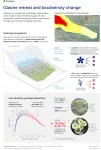Alpine plants at risk of extinction following disappearing glaciers
2021-01-29
(Press-News.org) Beyond the ski slopes, one of the most iconic symbols of the Alps are the alpine flowers. These plants are not only beautiful -- they are also used in liqueurs and medicines, and they form the foundation of the local food chains. But a recent study in Frontiers in Ecology and Evolution shows that, although plant diversity may initially increase with glacier retreat, many of these species may soon become endangered.
"Our results indicate that plant diversity will ultimately decrease once the glaciers disappear -- and up to 22% of the species we analyzed may locally disappear or even go extinct once the glaciers are gone," says lead author Dr Gianalberto Losapio of Stanford University in the USA. "We show that 'not all species are equal before global warming' and that there are some species benefiting from global warming -- the so- called 'winners,' -- while others -- 'the losers' -- will suffer."
As glaciers retreat, they expose newly available land for plants to grow, but this also changes the inhabitability and diversity of the downstream ecosystems. Losapio and his collaborators used geological records to reconstruct the positions of four glaciers in the Italian Alps, allowing them to approximate the age of downstream communities.
By combining this information with their own contemporary survey of 117 plant species and analyses of local environmental conditions, they used computational models to calculate how the plant distribution had changed over the past five millennia. These models also forecasted the effects of future glacier retreat.
Their findings indicated shifts in the interactions within plant communities, with competitive species becoming more prevalent in the long term. Although some cooperative species, such as Artemisia genipi, were the first to colonize terrain, their populations would decline within only 100 years.
Although there is some uncertainty in the calculated dates of the older communities, the researchers received similar estimates using alternative methods as well. These findings also do not explore the role of evolution, and it may be possible that some species have adapted to changing conditions in the past. But the unprecedented rate of current glacier retreat makes it unlikely that there is time for such adaptations now.
This study contributes to the United Nations' Convention on Biological Diversity and the UN Strategic Plan for Biodiversity 2011-2020. These objectives focus on understanding the mechanisms of biodiversity loss and increasing the conservation and sustainable management of threatened species and ecosystems.
"Plants are the primary producers at the basis of the food web that sustains our lives and economies, and biodiversity is key to healthy ecosystems -- biodiversity also represents an inestimable cultural value that needs to be properly supported," says Losapio. "Our study, with its results and innovative approach, may help conservationists, natural park managers and practitioners to mitigate and anticipate the consequences of anthropogenic impact on Earth's ecosystems."
INFORMATION:
[Attachments] See images for this press release:

ELSE PRESS RELEASES FROM THIS DATE:
2021-01-29
Methane (CH4) is the second most important greenhouse gas after carbon dioxide (CO2). Its concentration in the atmosphere has increased more than twice since the preindustrial era due to enhanced emissions from human activities. While the global warming potential of CH4 is 86 times as large as that of CO2 over 20 years, it stays in the atmosphere for about 10 years, much shorter than more than centuries of CO2. It is therefore expected that emission controlling of CH4 can benefit for relatively short time period toward the Paris Agreement target to limit the global warming well below 2 degrees.
A study by an international team, published ...
2021-01-29
New research from the University of Sheffield has found being overweight is an additional burden on brain health and it may exacerbate Alzheimer's disease.
The pioneering multimodal neuroimaging study revealed obesity may contribute toward neural tissue vulnerability, whilst maintaining a healthy weight in mild Alzheimer's disease dementia could help to preserve brain structure.
The findings, published in The Journal of Alzheimer's Disease Reports, also highlight the impact being overweight in mid-life could have on brain health in older age.
Lead author of the study, Professor Annalena Venneri from the University of Sheffield's Neuroscience Institute and NIHR Sheffield Biomedical Research Centre, ...
2021-01-29
Four million UK patients could benefit annually from genetic testing before being prescribed common medicines, according to new research from the University of East Anglia (UEA) in collaboration with Boots UK and Leiden University (Netherlands).
Researchers looked through 2019 NHS dispensing data across the UK to see how many patients are started on new prescriptions each year that could be potentially optimised by genetic testing.
They studied 56 medicines, including antidepressants, antibiotics, stomach ulcer treatments and painkillers where there are known drug-gene interactions.
And they found that in more than one in five occasions (21.1 ...
2021-01-29
An interdisciplinary team of the Institut national de la recherche scientifique (INRS) used an innovative imaging technique for a better understanding of motor deficits in Amyotrophic Lateral Sclerosis (ALS). The researchers were able to follow the escape behaviour of normal and disease zebrafish models, in 3D. Their results have recently been published in Optica, the flagship journal of the Optical Society (OSA).
Professor Jinyang Liang, expert in ultra-fast imaging and biophotonics, joined an effort with Professor Kessen Patten, specialist in genetics and neurodegenerative diseases. The two groups were able to track the position of ...
2021-01-29
New research from the University of Iowa and University Hospitals Cleveland Medical Center demonstrates that offspring can be protected from the effects of prenatal stress by administering a neuroprotective compound during pregnancy.
Working in a mouse model, Rachel Schroeder, a student in the UI Interdisciplinary Graduate Program in Neuroscience, drew a connection between the work of her two mentors, Hanna Stevens, MD, PhD, UI associate professor of psychiatry and Ida P. Haller Chair of Child and Adolescent Psychiatry, and Andrew A. Pieper, MD, PhD, a former UI faculty member, now Morley-Mather Chair of Neuropsychiatry at Case Western Reserve ...
2021-01-29
-- Experts call for policy reform to improve ethnic equity of socioeconomic opportunity, service provision, and health outcomes. They also call for long-term studies to investigate how structural and institutional racism generate these ethnic inequalities in health.
In 15 out of 17 minority ethnic groups, health-related quality of life in older age (over 55 year-olds) was worse on average for either men, women, or both, than for White British people according to an observational study published in The Lancet Public Health journal.
In five of those groups - Bangladeshi, Pakistani, ...
2021-01-29
Peer-reviewed / Simulation or Modelling / People
A new modelling study has estimated that from 2000 to 2030 vaccination against 10 major pathogens - including measles, rotavirus, HPV and hepatitis B - will have prevented 69 million deaths in low-income and middle-income countries (LMICs).
The study estimated that, as a result of vaccination programmes, those born in 2019 will experience 72% lower mortality from the 10 diseases over their lifetime than if there was no immunisation.
The greatest impact of vaccination was estimated to occur in children under five - mortality from the 10 diseases in ...
2021-01-28
Cities are not all the same, or at least their evolution isn't, according to new research from the University of Colorado Boulder.
These findings, out this week in Nature Communications Earth and Environment and Earth System Science Data, buck the historical view that most cities in the United States developed in similar ways. Using a century's worth of urban spatial data, the researchers found a long history of urban size (how big a place is) "decoupling" from urban form (the shape and structure of a city), leading to cities not all evolving the same--or even close.
The researchers hope that by providing this look at the past with this unique data set, they'll be able to glimpse the future, including the impact of population growth on cities or ...
2021-01-28
Boulder, Colo., USA: For most of Earth's history, life was limited to the microscopic realm, with bacteria occupying nearly every possible niche. Life is generally thought to have evolved in some of the most extreme environments, like hydrothermal vents deep in the ocean or hot springs that still simmer in Yellowstone. Much of what we know about the evolution of life comes from the rock record, which preserves rare fossils of bacteria from billions of years ago. But that record is steeped in controversy, with each new discovery (rightfully) critiqued, questioned, and analyzed from every angle. Even then, uncertainty ...
2021-01-28
Scientists are opening new windows into understanding more about the constantly shifting evolutionary arms race between viruses and the hosts they seek to infect. Host organisms and pathogens are in a perennial chess match to exploit each other's weaknesses.
Such research holds tantalizing clues for human health since the immune system is on constant alert to deploy counter measures against new viral attacks. But unleashing too much of a defensive response can lead to self-inflicted tissue damage and disease.
A new study published in the journal eLife by biologists at the University ...
LAST 30 PRESS RELEASES:
[Press-News.org] Alpine plants at risk of extinction following disappearing glaciers






